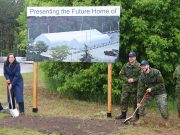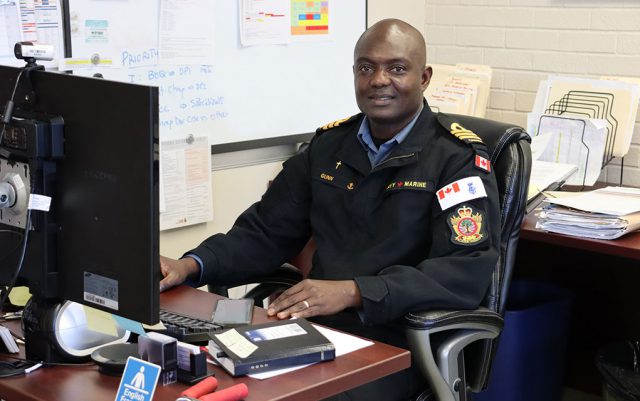Commander Éloi Gunn, Ph.D; D. Th, Canadian Forces Chaplain School and Centre. (Photo: Emily Nakeff)
In 1999 while in his twenties, Cdr Éloi Gunn, Ph. D, D. Th, first came to Canada from Togo, West Africa to pursue his studies in Theology and Philosophy, earning two doctorates at the University of Ottawa and Saint Paul University before starting his career. In January 2022, he was promoted to Commander of the Canadian Forces Chaplain School and Centre (CFChSC), the first Black man to hold the position. Serving through the military was never part of his plan—but to know Cdr Gunn is to know that change is absolutely essential.
He was serving at a parish near Woodstock, Ontario when a colleague introduced him to the military Chaplain branch. Though he didn’t make the change immediately, the idea stuck with him. Two years later, he knew it was time to answer the call.
“I applied because I want to say thank you to Canada,” said Cdr Gunn. As a first-generation immigrant, he’d built a life for himself in Canada beginning with his studies, and the family he’d started with his wife and three children. “I thought that’s the best way to say thank you, is to be able to lay down my life and support the people of Canada.”
His first posting was in Esquimault, BC, followed by Valcartier, Quebec before landing at Base Borden in 2017. He describes parish life and military chaplain life as two different worlds. Though there are certainly similarities between the two, Cdr Gunn says his time with the military has been rewarding in ways he never expected.
“I take pride when I am with my troops. I find it is a privileged platform for me to hear their joy and their pain,” said Cdr Gunn. “To be able to join in the journey with them, I find it very sacred.”
One of the biggest differences he’s noticed is the collaborative, team approach to getting the job done, something that extends beyond his assigned role.
For the past two years, Cdr Gunn has served as the Military Co-Chair of the Defense Visible Minorities Advisory Group (DVMAG). The group’s mandate is to support visible minorities so that they can do their best work without barriers due to bias, and to ensure a welcoming environment at Borden. He says the group’s regular meetings, where people feel they have a space to voice their concerns, is an achievement to be proud of.
But in order to improve the future, we must remember to look to our past. For Cdr Gunn, acknowledgment of the past is key to moving forward, allowing the current Black community of the CAF to feel they have a place where they belong.
“Black History Month in Canada, and especially in the CAF, is a way for us to say thank you to those people of colour who served the country and were not very well recognized because of discrimination and racism at the time,” said Cdr Gunn. “So for me, it is to recognize our past and appreciate and celebrate those people, and it’s also a way to say to the present black community in the CAF that we appreciate what you are bringing to the table. Your efforts [are] well received and your contributions are welcomed.”
Recognition of hard work is a cornerstone of Cdr Gunn’s leadership style, part of a crucial cycle of betterment for individuals, communities, and society as a whole.
“When an individual improves themselves, they improve society. Because I don’t believe society changes with a magic wand, or that it changes by policies or by punishment,” said Cdr Gunn. “I believe that society changes by changing the hearts and minds of each individual. And then if each individual does their job, then society completely changes.”
Though there is still work to be done, Cdr Gunn notes that there is positive change happening to provide better support and opportunity to visible minorities and acknowledge past mistakes.
“Society is moving in a very good direction where people are valued for what they bring to the table, not for the colour of their skin,” said Cdr Gunn. “We have to put the right person in the right position at the right time, without any racial biases. Hopefully I’m the right person at the right time.”
Always looking to learn from his own mistakes and improve himself as a leader and an individual, he hopes that his work in the role of Commander will change him enough to impact change and growth among his team, both in and out of uniform.
“If I improve myself then my team will improve, and together we will have an impact,” said Cdr Gunn. “There’s a place for everybody [in the military], you just need to trust in yourself and be willing to journey. Because we need more people from all diverse cultural backgrounds. That is our strength.”
By: Emily Nakeff, Editor











